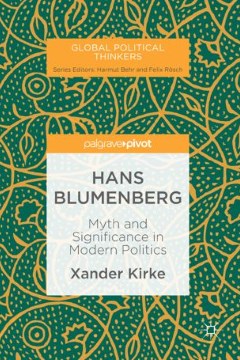Repository | Book | Chapter
Blumenberg, myth, and politics
pp. 83-114
Abstract
With the theoretical background for our analysis of Blumenberg established, this chapter seeks to review the political themes of his understanding of myth. Publications from research done into the Blumenberg Nachlass has indicated that Blumenberg himself was engaged closely with political issues. It analyses important works such as Moses the Egyptian, and considers how or whether myth can be legitimate in politics. To this end, it identifies three political and normative consequences. The first is that myth simplifies reality, and this is useful for answering existential needs but can also be problematic when discussing complex political issues. Secondly, that myth provides comfort from the variegated processes of the world. I explore how Blumenberg's theory implies a processual reality, and that myth offers a way of comforting us within these processes. Finally, I consider a potentially darker aspect of myth as understood by Blumenberg: the possibility of violence and extremism. The exceptional politics that is implicated in Moses the Egyptian in particular could, depending on perspective, justify exceptional action.
Publication details
Published in:
Kirke Xander (2019) Hans Blumenberg: myth and significance in modern politics. Basingstoke, Palgrave Macmillan.
Pages: 83-114
DOI: 10.1007/978-3-030-02532-8_5
Full citation:
Kirke Xander (2019) Blumenberg, myth, and politics, In: Hans Blumenberg, Basingstoke, Palgrave Macmillan, 83–114.




